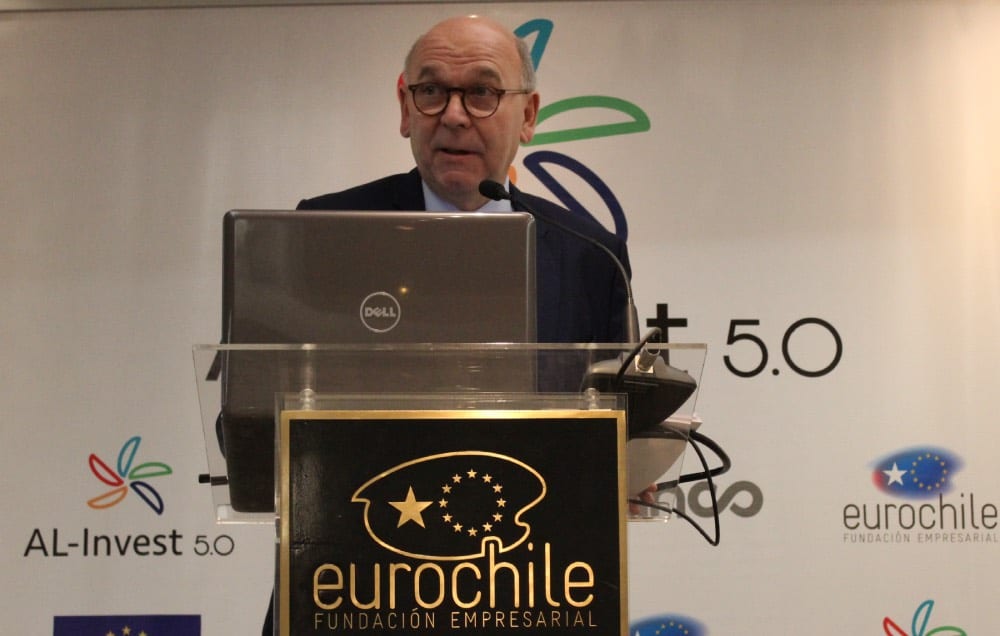Yves Gidoin, from Vegepolys Valley: “We will see the consequences of Covid when the crisis ends and the economy recovers”
Vegepolys Valley is a public-private network of companies, research centers and training centers that is deployed in the French regions of Brittany, Pays de la Loire, the Center-Val de Loire, and Auvergne-Rhône-Alpes, covering all the innovation agriculture value chain in plants, for plants and with plants.
With nearly 500 partners and a global mission to transform itself into an international cluster of plants for agriculture, combining competitiveness with respect for the environment and health, today it is also facing the new challenges that the coronavirus imposes on its daily work, to their communities, and also to the markets.
Yves Gidoin, International Vice President of Vegepolys, says that since March 15, all Vegepolys Valley staff is working remotely, some of them part-time due to school closure. And like what happened in Chile in recent weeks, all physical meetings are postponed or turned into digital events, as happened with the working group for Latin America planned for April 7 and conducted 100% online.
What has happened with the projects carried out by Vegepolys in front of the scenario imposed by Covid-19, how does it work in its continuity?
Vegepolys Valley leads different types of projects from a very local scale to regional scales and finally to a European scale, where we support and follow our members to establish new innovation projects. Of course, in this scenario each situation is evaluated on a case-by-case basis. For the European project, for example, we decided to go ahead even with internationalization tasks, because the Covid-19 is paralyzing many events and nobody can guarantee a return to “normality” before the end of the project. As for our members, we see an increase of ideas and projects, and our team has been working hard since March to prepare and identify the best approach for these potential projects.
What kinds of situations have been the most complex to resolve so far?
First of all, we try to support our members in the best possible way. At the company level, we seek to be an interface to access economic mitigation measures region by region, at the state level and in Europe. Regarding education, we opened a platform for students with a canceled or pending training period, and we proposed to link them with companies with reference or market research, if possible from home. And generally speaking, we hold webinars and prepare new types of remote events to keep in touch. But, without a doubt, for the cluster it is impossible – in this context – to really wait or press for the invoices and membership fees to materialize. This 2020 could be a difficult year for our own budget balance since 50% comes from the members themselves, but our priority is to support them in this difficult period.
How has this crisis affected the world of agriculture in France, especially horticulture?
The situation is very complicated for horticultural producers, especially for flower and plant productions. As we are in spring season, our greenhouses are full of products and the selling points have been closed for four weeks. We had to do a lot of destruction and the losses are enormous, from 50% to 80% depending on the productions. For the other agricultural activities, the situations are variable. But business is generally slow, particularly for exports.
In this crisis scenario, have opportunities arisen in the world of horticulture?
Until now it is difficult to imagine opportunities because there are no shipping possibilities. We will see the consequence of Covid when the crisis ends and the economy recovers.
Are there measures implemented in France that could be applied in the agricultural world in Chile?
It is still difficult to imagine what kind of support we will have. Everyone is asking for financial assistance, and I’m not sure everyone will get enough money to survive.
How do you see the scenario once the health crisis ends and the economy begins to recover?
To limit the impacts of COVID, we have to find a new system of life and relationships for our population, with a chain of solidarity to avoid the social crisis.
What actions is Vegepolys defining for this second phase after COVID-19? And which are the sectors that will need more support and of what type?
It is still too early to risk a conclusion or talk about the post-crisis. Our role will remain to boost innovation, and support the growth and internationalization of our members. Adaptation will be the keyword, and the Covid-19 will likely change our mindset for events or travel.

